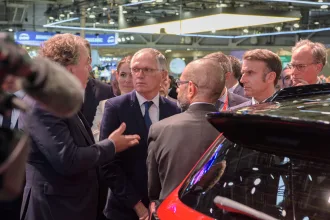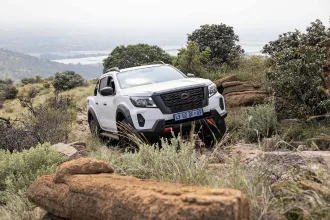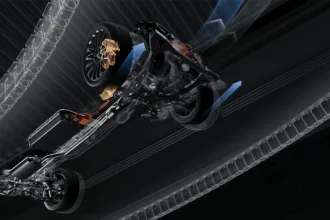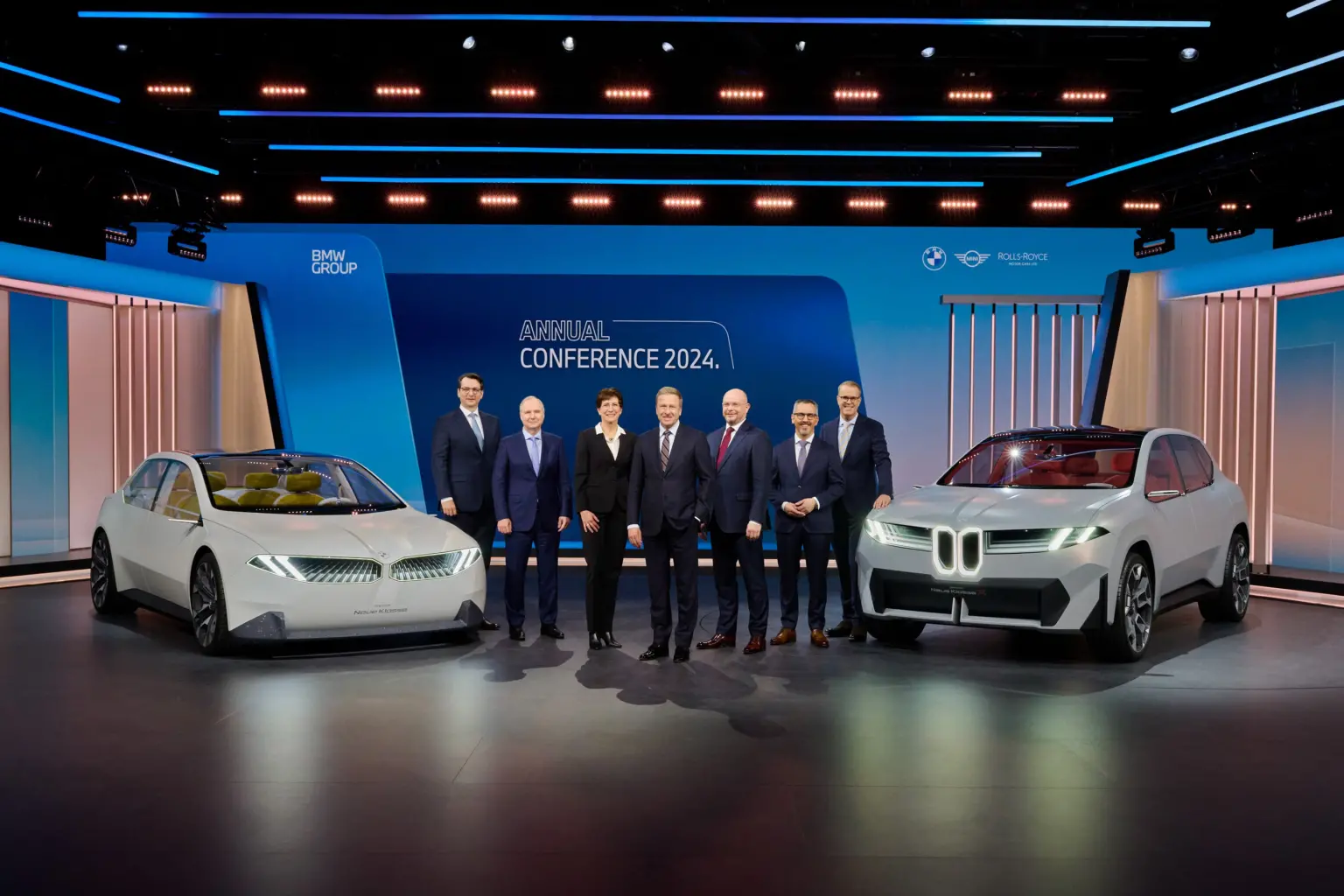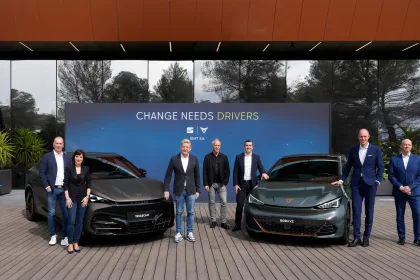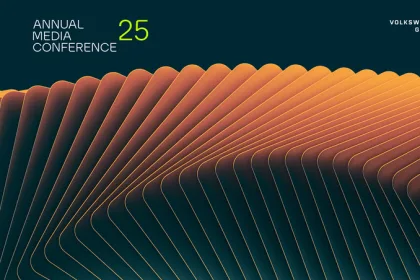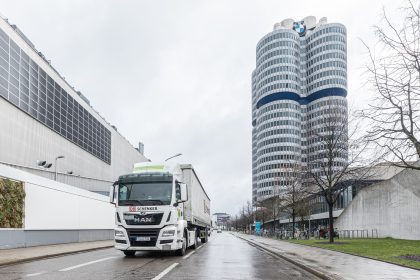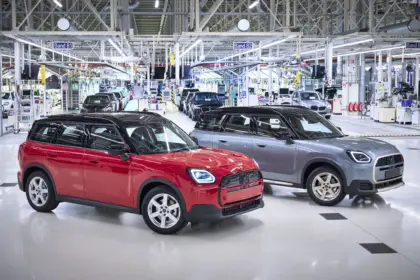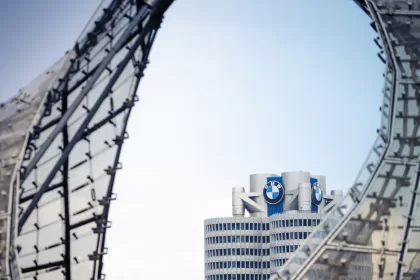Strong products, strong demand, strong results: Following a successful 2023, in which the Automotive Segment reported its highest-ever operating result, the BMW Group aims to continue on its profitable growth course in the current financial year. Fully-electric vehicles (BEVs) and models from the upper premium segment should remain the main growth drivers again in 2024 – including the BMW 7 Series models, the BMW X7 and the Rolls-Royce model family, with the fully-electric Rolls-Royce Spectre*.
In both segments, the BMW Group expects to see significant double-digit growth in the current financial year. In addition, the BMW 5 Series models, including the BMW i5*, which will also be available for the first time as a fully-electric Touring model this year, plus vehicles from BMW M GmbH, will contribute as well.
Overall, the BMW Group expects to see a slight increase in deliveries in the Automotive Segment in 2024.
“The more challenging the framework conditions become, the more important it is to implement a consistent strategy. As a result, strong products and a high degree of responsiveness will remain our key success factors in 2024. This will continue to make us a reliable partner for customers, investors and stakeholders in the future,” said Oliver Zipse, Chairman of the Board of Management of BMW AG, on Thursday.
R&D spending and capital expenditure to peak in 2024, as planned
The company will maintain its strategic course, as planned, in 2024, with extensive investment in its plants, its range of premium vehicles and innovative technologies. This is seen in the construction of the plant in Debrecen (Hungary) and high-voltage battery assembly facilities in Shenyang (China), Woodruff (USA), San Luis Potosì (Mexico) and Irlbach-Straßkirchen (Lower Bavaria). With extensive expansion at Plant Munich and electrification of the MINI plant in Oxford, capital expenditure is set to peak in 2024. Digitalisation of the company and its products also necessitate higher spending.
In addition to capital expenditure, R&D spending will also reach a new high this year. This will mainly be focused on electrification of the vehicle portfolio, including the products of the NEUE KLASSE, as well as in-car digital innovations, such as connectivity, software stacks and automated driving.
“We are investing in the future of our company like never before. Construction and modernisation of our plants and the planned expansion of our portfolio are progressing quickly this year. Our capital expenditure and R&D spending will reach new levels. We are expecting a capex ratio above 6% and an R&D ratio above 5%. Both metrics will then return to their usual strategic range. Despite these major investments in our future, we are targeting a free cash flow of over six billion euros in the Automotive Segment in 2024. This speaks to the financial strength of the BMW Group,” said Walter Mertl, member of the Board of Management responsible for Finance. “We continue to focus on cost discipline and sustainable profitability – the long-term target range of 8-10% for EBIT margin in the Automotive Segment remains our benchmark.”
The company is also aiming to achieve an Automotive EBIT margin of 8-10% for the current financial year. This includes the continued dampening effect of depreciation and amortisation for BBA assets from the purchase price allocation.
Compelling products – BEV offering as main growth driver
In 2023, the BMW Group significantly increased (+74.2%) its sales of fully-electric vehicles to over 375,000 units, clearly underlining its role as an e-mobility pioneer. The company thus delivered significantly more fully-electric vehicles to customers than its direct European competitors and also significantly more than most of the new-entry players from Asia and the US.
This success is built on the strong product substance of these vehicles, as confirmed by numerous studies. For example, in February, renowned US consumer portal Consumer Reports named BMW “best brand” for the second consecutive year. The platform compared 34 automotive manufacturers and ranked them on the basis of road test scores, reliability, customer satisfaction and safety criteria. All 12 BMW models examined received a clear “buy” recommendation – as did the two MINI models tested, which also earned the brand one of the top positions.
Another double win came in a study conducted by US market research company J.D. Power, which looked at customers’ experience with electric vehicles: The overall winner was the BMW i4*, while the best model in the lower price segment was the MINI Cooper SE*.
With the fully-electric BMW i5, which will also be released onto the market this year as the first fully-electric Touring model, and the New MINI Family, the BMW Group will have a BEV option in virtually all its main segments. There will be more than 15 fully-electric models across all BMW Group brands on the market in 2024.
Combined with the growing efficiency of internal combustion engines, the BMW Group has substantially lowered its fleet-wide CO2 emissions, specifically in Europe: Based on preliminary figures, EU fleet emissions were reduced to 102.1 g CO₂/km in 2023. The BMW Group thus outperformed its required fleet target of 128.5 g CO₂/ km by more than 20%. A further reduction is expected in 2024.
Diverse product range guarantees growth
The diversity of the BMW Group’s product range has proven to be a guarantee of growth at the start of 2024: In the first two months of the year, the BMW Group was able to increase its sales of fully-electric vehicles by a significant double-digit percentage, compared to the same period of last year. Growth was disproportionately strong in the US, where the company’s BEV sales almost doubled in the year to the end of February. In Europe and China, deliveries of fully-electric models also posted significant double-digit growth.
At the same time, deliveries of vehicles with highly efficient combustion engines also rose in the year to the end of February. Strong customer demand for BMW Group models, regardless of the drive technology, combined with the high level of flexibility and responsiveness in the value chain, are important building blocks for the success of the company.
Vehicles with plug-in hybrid technology (PHEVs) also remain an essential component of the BMW brand’s electrification strategy. Despite strong BEV growth, especially in Europe, demand for these models should remain stable this year. This technology is also making a valuable contribution to further CO2 reductions and plays a part in introducing customers to e-mobility. Company-wide, over 560,000 electrified units (BEVs + PHEVs) were already delivered to customers in 2023. This is equivalent to 22% of total BMW Group sales.
The strong popularity of PHEV models has also helped the BMW Group already surpass the total of more than two million electrified vehicles (BEVs + PHEVs) to customers. Around 55% of these vehicles were PHEVs and about 45% BEV models. However, sales of fully-electric vehicles have risen much faster in recent years than PHEV models.
MINI and Rolls-Royce to become electric-only brands
The MINI and Rolls-Royce brands are well on their way to a fully-electric future from the early 2030s onwards. A glimpse of this is already provided by the New MINI Family and Rolls-Royce Spectre, with the first units already delivered to customers. New orders for Rolls-Royce Spectre already extend into 2025. Production of the new MINI Countryman* has now also ramped up for the first time at BMW Group Plant Leipzig, where it will be built as a fully-electric model and with a highly efficient internal combustion engine.
With this extensive range of electric models, the BMW Group expects to maintain its consistent growth trajectory in the years to come. In the second half of the decade, the NEUE KLASSE, with its impressive product substance, has the potential to further accelerate the market penetration of e-mobility. Depending on prevailing market conditions in the second half of the decade, development of raw material prices and availability, and the pace at which a comprehensive charging infrastructure is created, more than 50% of all BMW Group vehicles delivered worldwide could have a fully-electric drive train before 2030. If PHEV models are included, this percentage is correspondingly higher.
NEUE KLASSE in the starting blocks: BMW Vision Neue Klasse X underlines breadth of future BMW model line-up – new level of driving pleasure
Just one year before production of the NEUE KLASSE gets underway, a new Vision Vehicle previews the BMW Group’s future fully-electric SAV segment: The BMW Vision Neue Klasse X brings the philosophy and technology of the NEUE KLASSE to the Sports Activity Vehicle sector, a segment that has accounted for a growing percentage of BMW Group sales in recent years. In 2023, one out of every two BMW vehicles delivered to customers was an X model. “Together with the BMW Vision Neue Klasse, the BMW Vision Neue Klasse X showcases the breadth of our future BMW model line-up. From sporty sedan, with all its derivatives, to modern SAV family: The NEUE KLASSE reflects the variety of models that customers want today and in the future,” said Zipse. “In this way, we are underlining that the NEUE KLASSE is much more than just a car or a specific concept; it is redefining the BMW brand – and, at the same time, will be more BMW than ever.”
The BMW Vision Neue Klasse X also demonstrates how the three main characteristics of the NEUE KLASSE – electric, digital and circular – can be expanded to include a fourth dimension: The driving pleasure that forms the core of the BMW brand is taken to the next level with drive and chassis control developed specially for the NEUE KLASSE and with the sixth generation of BMW eDrive technology. The aim is for the NEUE KLASSE to offer “BMW driving pleasure” at an even higher level.
In the BMW vehicle of the future, this will be ensured by two of the four completely new highly integrated electronic control units, working smartly together on what was previously processed separately. The first control unit integrates the entire powertrain and driving dynamics, with up to ten times more computing power, based on a new software stack developed in-house by the BMW Group. The second control unit will enable the next quantum leap in automated driving. More detailed information on the other two highly integrated electronic control units – one in charge of connectivity and infotainment functionality, the other clustering more than 100 core vehicle functions, from the digital car key, to energy supply, to wire harness communications – will be provided at a later date.
In addition to further improved e-drive units, this sixth generation of BMW eDrive technology also features new, now round, lithium-ion battery cells, with a volumetric energy density over 20% higher than that of the prismatic cells previously used. In combination with the transition to an 800-volt system, this will improve charging speed by up to 30% – allowing vehicles to charge sufficiently for a 300-kilometre range in just ten minutes. The sixth generation of BMW eDrive also delivers up to 30% more range. At the same time, this new technology generation should significantly reduce costs: Compared to today’s Gen5 technology with a comparable range, the cost of the electric Gen6 system, i.e. the high-voltage battery with powertrain, should be 40-50% lower.
When it comes to aerodynamics, the BMW Vision Neue Klasse X boasts an impressive new top figure: Drag has been reduced by 20%, compared to a comparable model in the current line-up. New tyre designs and a special brake system for fully-electric vehicles help boost the vehicle’s overall efficiency by up to 25%.
New generation of BMW iDrive takes user interaction to next level
The BMW Group already presented its vision of the future digital experience, both inside and outside the vehicle, with BMW i Vision Dee, at the CES in Las Vegas in 2023. The new BMW iDrive, now showcased in the BMW Vision Neue Klasse X, is based on a highly integrated software architecture and relies on the next-generation BMW Operating System.
In this vehicle, BMW Panoramic Vision projects key information across the full width of the windscreen. This will be complemented in the NEUE KLASSE by the enhanced BMW 3D Head-Up Display. In combination with a newly developed steering wheel with multifunction buttons, the new Central Display and the advanced voice control of the BMW Intelligent Personal Assistant, BMW iDrive takes interaction between the driver and their vehicle to a whole new level.
Technology clusters: Latest innovations – regardless of powertrain
However, going forward, all these innovations and technological advances are not just designed to benefit the models of the NEUE KLASSE, but the whole BMW product line-up. The basis for this is the modular principle the BMW Group has established in its technology clusters. These technology clusters, covering the areas digital, drive train, driving exterior and interior, can be used across segments for most of our product line-up. They are scalable, can be used on all architectures and can thus be modified for different vehicle concepts and segments.
“Our technology clusters give us important leverage for fast and efficient scaling of innovations and technological advances. In this way, we are able to ensure that we offer our customers the latest technology – regardless of the segment and the vehicle’s powertrain,” said Zipse.
NEUE KLASSE test drives now underway
These innovations will be making their debut in the NEUE KLASSE very soon. The first vehicles are currently completing test drives under extreme conditions. Series production will then ramp up in the second half of 2025 at the high-volume core of the BMW brand, with a Sports Activity Vehicle that is previewed in the BMW Vision Neue Klasse X. This will be followed by a sedan in the current 3 Series segment, which the BMW Vision Neue Klasse provided an initial glimpse of at the IAA MOBILITY. We intend to launch a total of at least six NEUE KLASSE models across the BMW Group’s global production network within the first 24 months of the start of production.
The NEUE KLASSE will be launched in 2025 at the new BMW Group Plant Debrecen (Hungary), which will exclusively produce vehicles for the NEUE KLASSE. From 2026 onwards, NEUE KLASSE models will also be built at the more than 100-year-old main plant in Munich, which is currently completing the necessary preparations to transition to BEV-only production from 2027. In the same year, series production of the NEUE KLASSE will begin at Plant San Luis Potosí (Mexico), while the production site in Shenyang (China) is also gearing up for production of the NEUE KLASSE.
Hydrogen fuel cell as further pillar of drive technology
The BMW Group still assumes that not all markets worldwide will have the necessary framework conditions for all customers to transition to pure electromobility in the coming decade. Consequently, a range of products with highly efficient conventional drive technology will still be needed to meet people’s individual mobility requirements, while contributing to CO2 reduction in the transport sector.
Hydrogen fuel cell technology is also expected to account for a growing percentage of the drivetrain mix from the second half of the decade onwards. The BMW Group is systematically pushing forward with development of this technology as an additional option for sustainable individual mobility and – depending on market requirements and how conditions develop – could envision a potential production vehicle in the second half of the decade. A pilot series of the BMW iX5 Hydrogen* was presented to media from around the world for the first time in 2023. Since then, the fleet has been deployed with great success for demonstration and testing purposes among various target groups.
With its high-performance fuel cell and optimised power battery, the drive system in the BMW iX5 Hydrogen is unique worldwide. The gaseous hydrogen needed to supply the fuel cell is stored in two 700-bar tanks made of carbon-fibre reinforced plastic (CFRP). Together, they hold six kilograms of hydrogen, which gives the BMW iX5 Hydrogen a range of 504 kilometres in the WLTP cycle. Refilling the hydrogen tanks only takes three to four minutes – so, with just a few, short stops, the BMW iX5 Hydrogen is still able to ensure typical BMW driving pleasure, even over long distances.
Sustainability built into strategy
In 2021, the BMW Group became the first German automotive manufacturer to join the Business Ambition for 1.5° C campaign launched by the Science Based Targets initiative and therefore committed to the goal of complete climate neutrality throughout the entire value chain by 2050 at the latest.
To take into account all aspects of holistic sustainability, the BMW Group is leveraging its “secondary first” approach to gradually increase the percentage of recycled and reusable materials used in the vehicles of the NEUE KLASSE. Back in 2021, the BMW i Vision Circular already provided a glimpse of what individual, sustainable, luxurious mobility in the urban environment could look like in 2040: built from secondary material and renewable raw materials – and completely recyclable.
BMW meets all business objectives for 2023, as forecast
In financial year 2023, the BMW Group achieved its business objectives, as forecast. With a total of 2,554,183 premium vehicles delivered to customers (+6.4%), this represented a solid increase. Group revenues for the full year rose to € 155,498 million (+9.0%). In addition to the full consolidation of BBA, revenues were primarily driven by higher sales volumes and positive product mix effects. Earnings before financial result (EBIT) climbed to € 18,482 million (+32.0%).
The pre-tax earnings of € 17,096 million reflect a corresponding base effect: In the prior year, the revaluation of previously held shares in BBA of € 7.7 billion had significantly increased the BMW Group’s financial result and Group earnings. In the absence of this effect, pre-tax earnings (-27.3%) and Group net profit (-34.5%) for 2023 were significantly lower than the previous year. Without the one-time revaluation effect referred to, Group net profit for 2023 would have been solidly higher year-on-year.
In the Automotive Segment, earnings before financial result (EBIT) increased significantly to € 12,981 million (+22.1%). Tailwinds came from the full consolidation of BBA, as well as sales growth and an improved product mix. This was offset by headwinds from research and development spending, as well as higher material costs. The EBIT margin for this period was 9.8% (2022: 8.6%). Excluding depreciation and amortisation for BBA assets from the purchase price allocation of € 1.4 billion previously referred to, the EBIT margin was 10.8%.
Thanks to this positive earnings development,the segment’s free cash flow totalled € 6,942 million at the end of December (2022: € 11,071 million/-37.3%), despite higher capital expenditure. The previous year included the positive one-time effect of € 5 billion from the full consolidation of BMW Brilliance.
The BMW Group’s capital expenditure amounted to € 8,836 million (+8.5%) in 2023. Substantial expenditure was channelled into the electrification and autonomous driving modules, setting up high-voltage battery production in various markets and plant construction in Debrecen, Hungary.
Group research and development expenses totalled € 7,538 million (+13.8%). In addition to development expenses for the future models of the NEUE KLASSE, R&D spending was primarily focused on further electrification and digitalisation of the vehicle portfolio and automated driving.
Dividend of € 6.00 proposed – profit-sharing bonus for employees
The BMW Group’s high profitability is confirmed by the key figure “earnings per share” (EPS) which was € 17.67 for 2023. The high figure for the previous year of € 27.31 per share reflects the one-time effect from the revaluation of previously held BBA shares in the amount of € 7.7 billion. Without this effect, the figure for 2022 would have been € 15.66 per share, therefore the EPS in 2023 would reflect a significant increase of 12.8%.
The BMW Group reliably shares its success with its shareholders, with a payout ratio within the usual range of 30-40% for financial year 2023. The Board of Management and Supervisory Board will propose a dividend of € 6.00 per share of common stock (2022: € 8.50) and € 6.02 per share of preferred stock (2022: € 8.52) to the Annual General Meeting on 15 May. This represents a preliminary payout ratio of 33.7% (2022: 30.6%).
In keeping with the principle of performance and reward, employees in Germany will also share in the success of the company in an appropriate manner. For example, a skilled worker will receive € 8,400 for financial year 2023 (based on the salary group ERA 5 based on the Metal and Electronical Industry Bavaria), as well as another component for their pension plan.
Outlook for 2024: BMW Group expects profitable growth
In the Automotive Segment, owing to a slight increase in demand, full availability of new models and the upcoming model launches, deliveries of BMW, MINI and Rolls-Royce vehicles are projected to be slightly higher than the previous year. Fully-electric vehicles’ share of deliveries is forecast to increase significantly, compared to 2023. The EBIT margin in the Automotive Segment should be within the range of 8-10% in 2024.
A slight reduction in the CO2 emissions of the EU new car fleet is to be expected, thanks to further improvement in vehicle fuel consumption and the rising number of vehicles with an electric drivetrain. The company therefore also expects its numbers to once again be significantly lower than the official targets in the EU.
The stable demand situation is also reflected in the Motorcycles Segment. Combined with full availability of models, including the BMW R 1300 GS, slightly higher deliveries are also expected in this segment. The EBIT margin is projected to be within the target range of 8-10%.
In the Financial Services Segment, RoE is forecast to be between 14-17%. As expected, supply and demand continues to normalise in the used car markets. It is therefore expected that revenues from remarketing lease returns will decrease further as compared to 2023.
Also due to this trend, Group earnings before tax will decrease slightly. Since the BMW Group continues to be a leader among its competitors in digitalisation and electrification of the vehicle fleet and intends to expand this position further, R&D spending and capital expenditure for future projects will peak in the Automotive Segment in 2024. The production network will also be further expanded in 2024 in connection with the NEUE KLASSE.
The above targets will be achieved with slightly higher employee numbers. The percentage of women in management positions at the BMW Group is also forecast to increase slightly.
Growing uncertainty around macroeconomic and geopolitical conditions could cause economic performance in some regions to deviate from the expected trends and developments. This concerns trade and customs policy, security policy and possible intensification of international trade disputes. The war in Ukraine and potential implications for the BMW Group’s business performance are also being closely monitored. The applicable restrictions, due to sanctions, have already been factored into the company’s guidance.
* * *
| The BMW Group – an overview: Full year 2023 | 2023 | 2022 | Change in % | |
| Deliveries to customers | ||||
| Automotive1 | units | 2,554,183 | 2,399,632 | 6.4 |
| BMW | units | 2,252,793 | 2,100,689 | 7.2 |
| MINI | units | 295,358 | 292,922 | 0.8 |
| Rolls-Royce | units | 6,032 | 6,021 | 0.2 |
| Motorcycles | units | 209,066 | 202,895 | 3.0 |
| Employees (as of 31 Dec. 2023) | 154,950 | 149,475 | 3.7 | |
| EBIT margin Automotive Segment | percent | 9.8% | 8.6% | 14.1 |
| EBIT margin Motorcycles Segment | percent | 8.1% | 8.1% | – |
| EBT margin BMW Group2 | percent | 11.0% | 16.5% | -33.3 |
| Revenues | € million | 155,498 | 142,610 | 9.0 |
| Automotive | € million | 132,277 | 123,602 | 7.0 |
| Motorcycles | € million | 3,214 | 3,176 | 1.2 |
| Financial Services | € million | 36,227 | 35,122 | 3.1 |
| Other Entities | € million | 11 | 8 | 37.5 |
| Eliminations | € million | -16,231 | -19,298 | 15.9 |
| Profit before financial result (EBIT) | € million | 18,482 | 13,999 | 32.0 |
| Automotive | € million | 12,981 | 10,635 | 22.1 |
| Motorcycles | € million | 259 | 257 | 0.8 |
| Financial Services | € million | 3,055 | 3,163 | -3.4 |
| Other Entities | € million | -13 | -203 | 93.6 |
| Eliminations | € million | 2,200 | 147 | – |
| Profit before tax (EBT) | € million | 17,096 | 23,509 | -27.3 |
| Automotive | € million | 12,642 | 18,918 | -33.2 |
| Motorcycles | € million | 258 | 269 | -4.1 |
| Financial Services | € million | 2,962 | 3,205 | -7.6 |
| Other Entities | € million | -100 | 995 | – |
| Eliminations | € million | 1,334 | 122 | – |
| Group income taxes | € million | -4,931 | -4,927 | 0.1 |
| Net profit | € million | 12,165 | 18,582 | -34.5 |
| Earnings per share of common stock | € | 17.67 | 27.31 | -35.3 |
| Earnings per share of preferred stock3 | € | 17.69 | 27.33 | -35.3 |
| The BMW Group – an overview: Q4 2023 | Q4 2023 | Q4 2022 | Change in % | |
| Deliveries to customers | ||||
| Automotive | units | 717,620 | 651,794 | 10.1 |
| BMW | units | 631,526 | 566,823 | 11.4 |
| MINI | units | 84,616 | 83,651 | 1.2 |
| Rolls-Royce | units | 1,477 | 1,320 | 11.9 |
| Motorcycles | units | 44,349 | 43,562 | 1.8 |
| Employees (as of 31 Dec. 2023) | 154,950 | 149,475 | 3.7 | |
| EBIT margin Automotive Segment | percent | 8.5% | 8.5% | – |
| EBIT margin Motorcycles Segment | percent | -7.6% | -9.4% | -19.0 |
| EBT margin BMW Group | percent | 8.6% | 8.2% | 4.1 |
| Revenues | € million | 42,968 | 39,522 | 8.7 |
| Automotive | € million | 37,283 | 34,571 | 7.8 |
| Motorcycles | € million | 643 | 691 | -6.9 |
| Financial Services | € million | 9,504 | 9,086 | 4.6 |
| Other Entities | € million | 2 | 2 | – |
| Eliminations | € million | -4,464 | -4,828 | 7.5 |
| Profit before financial result (EBIT) | € million | 4,412 | 3,500 | 26.1 |
| Automotive | € million | 3,171 | 2,932 | 8.2 |
| Motorcycles | € million | -49 | -65 | 24.6 |
| Financial Services | € million | 606 | 536 | 13.1 |
| Other Entities | € million | 0 | -16 | – |
| Eliminations | € million | 684 | 113 | – |
| Profit before tax (EBT) | € million | 3,682 | 3,253 | 13.2 |
| Automotive | € million | 3,031 | 3,009 | 0.7 |
| Motorcycles | € million | -53 | -57 | 7.0 |
| Financial Services | € million | 511 | 533 | -4.1 |
| Other Entities | € million | -212 | -263 | 19.4 |
| Eliminations | € million | 405 | 31 | – |
| Group income taxes | € million | -1,068 | -1,078 | 0.9 |
| Net profit | € million | 2,614 | 2,175 | 20.2 |
| Earnings per share of common stock | € | 3.77 | 3.43 | 9.9 |
| Earnings per share of preferred stock | € | 3.78 | 3.44 | 9.9 |

